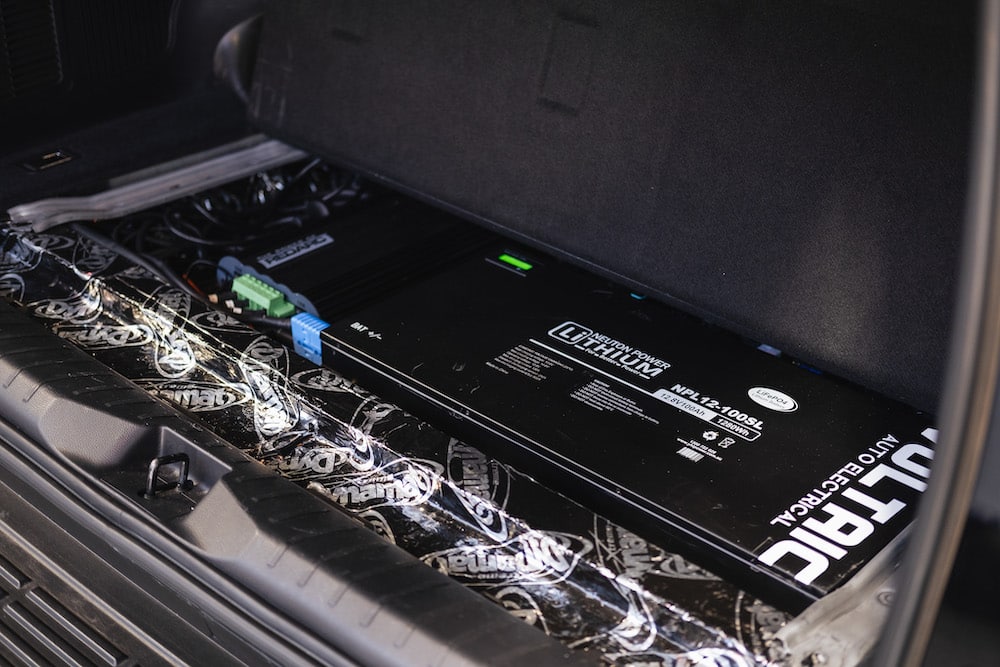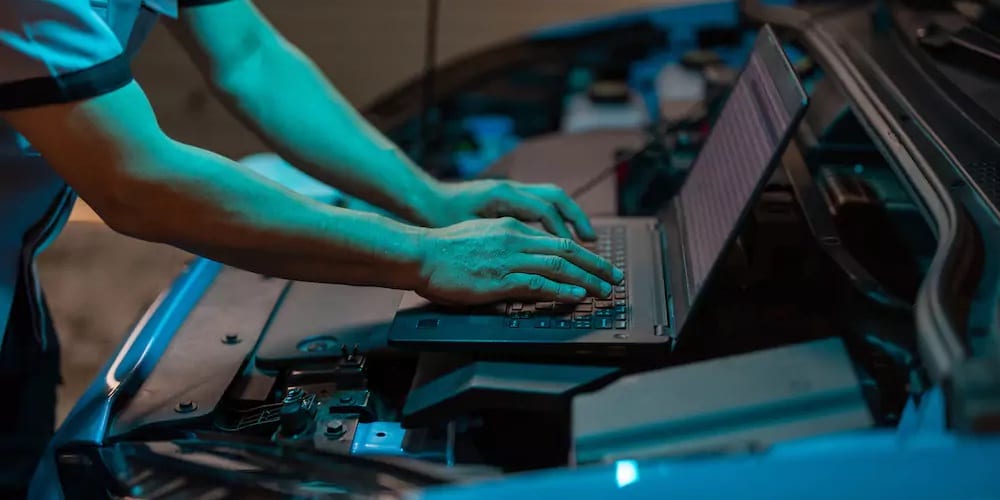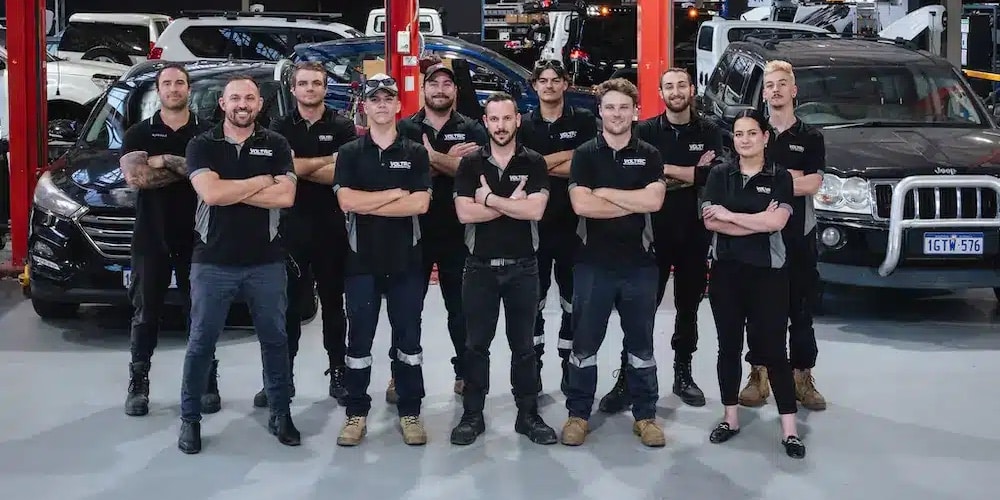Yes, electric cars do indeed require servicing, albeit less frequently and with different needs compared to their internal combustion engine (ICE) counterparts.
This guide delves into the servicing requirements of electric vehicles, highlighting what owners can expect.
Key Takeaways
- Yes, electric cars do require servicing, albeit less frequently than their internal combustion counterparts, focusing on different components and areas.
- Servicing for electric vehicles primarily involves battery health checks, electric motor and inverter maintenance, cooling system inspections, brake system checks, software updates, and inspections of the high-voltage electrical system.
- Specialised knowledge and equipment are necessary for EV servicing, highlighting the importance of using qualified technicians with training in electric vehicle maintenance.
- Regular maintenance of electric vehicles is crucial for ensuring their optimal performance, safety, longevity, and to maximise their environmental benefits.
Key Service Areas for Electric Cars
When it comes to electric vehicles (EVs), the service areas and considerations are a bit different from traditional petrol or diesel vehicles. Here’s a rundown of the key service areas and considerations for EVs:
Battery Health and Management
The battery pack is the heart of an EV. Regular checks on its health, capacity, and overall performance are crucial. Battery management systems (BMS) monitor the battery’s state and ensure optimal performance.
Electric Motor and Inverter Maintenance
The electric motor and inverter are key components that convert electrical energy into mechanical energy. These components require less maintenance than internal combustion engines but should be inspected for wear and efficient operation.
Cooling Systems
EVs use cooling systems to maintain optimal operating temperatures for the battery, motor, and electronics. These systems need regular checks to ensure they are functioning properly and are free of leaks.
Brake System
While EVs benefit from regenerative braking, which reduces wear on the brake pads, the brake system still needs regular checks and maintenance.
Software Updates
EVs rely heavily on software for vehicle operation. Regular updates can improve vehicle performance, battery management, and even add new features.
High-Voltage Electrical System Inspections
Safety inspections of the high-voltage cables and components are necessary to ensure there are no leaks or damage that could pose risks.
Special Considerations for EVs
To maximise your EVs performance, lifespan, and environmental benefits, there are a few extra things to consider. This includes:
Using a Mechanic With Specialised Training
- High-Voltage Safety: Mechanics working on EVs need to understand the risks associated with high-voltage systems. Specialised training is crucial to ensure safe handling of these components to prevent electric shock.
- Certifications: Look for technicians who have certifications in electric vehicle maintenance and repair. This ensures they have the knowledge and skills necessary to work on EVs safely and effectively.
Specific Diagnostic Tools and Equipment are Needed
- Advanced Diagnostics: EVs require specific diagnostic tools to read and interpret the vast amount of data from the vehicle’s onboard computers. These tools can diagnose issues with the battery, motor, and electronic systems.
- Specialised Repair Equipment: Unlike traditional vehicles, EVs need specialised equipment for tasks such as battery management system diagnostics and high-voltage system repairs.
Battery Replacement Costs and Lifespan
- Battery Degradation: Over time, EV batteries lose capacity, which can reduce the vehicle’s range. Understanding the factors that affect battery health, such as temperature extremes and charging habits, is important.
- Cost Considerations: The high cost of battery replacement is a significant consideration. Some manufacturers offer battery warranties that cover degradation beyond a certain threshold, which can alleviate concerns.
Your Charging Infrastructure
- Home Charging Setup: Installing a home charging station (Level 2 charger) requires an upfront investment and possibly upgrades to the home’s electrical system.
- Public Charging Availability: Access to public charging stations, especially fast chargers, can vary significantly by location. Planning for longer trips may require consideration of charging station locations.
Environmental Considerations
- Recycling and Disposal: As EVs become more common, the recycling and disposal of batteries become important environmental considerations. Ensuring batteries are properly recycled at the end of their life cycle is crucial to minimise environmental impact.
- Energy Source: The environmental benefits of driving an EV can vary based on the source of electricity. In areas where electricity is generated from renewable sources, EVs have a smaller carbon footprint.
Insurance and Warranty
- Insurance Costs: Insurance for EVs can be different from traditional vehicles due to the higher cost of replacement parts and specialised repair processes. It’s worth comparing insurance options.
- Warranty Coverage: Understanding the warranty coverage for the battery and other critical EV components is essential. Some manufacturers offer extended warranties for the battery pack, which can provide peace of mind.
By keeping these considerations in mind, EV owners and service professionals like myself can ensure that electric vehicles are maintained properly, which will help to maximise their performance, lifespan, and environmental benefits.
Electric vs ICE Servicing
As you probably expected, there are several key differences between electric and non-electric car servicing.
Below, I have outlined what I believe to be the key differences:
| Factor | Electric Car Servicing | Non-Electric Car Servicing |
|---|---|---|
| Mechanical Complexity | Lower complexity with fewer moving parts. Focus on electric motor and battery. | Higher complexity with intricate engines, transmissions, and exhaust systems. |
| Servicing Frequency | Less frequent due to fewer mechanical parts and no oil changes. | More frequent servicing for oil changes, spark plug replacements, etc. |
| Maintenance Focus | Concentrated on battery health, software updates, and electric drivetrain components. | Focuses on engine and transmission maintenance, including fluid and filter changes. |
| Servicing Costs | Generally lower over vehicle’s lifetime. Battery replacement can be costly but is infrequent. | Higher due to regular engine maintenance and part replacements. |
| Diagnostic and Software Updates | Relies on software for performance, benefits from periodic updates often delivered remotely. | Less reliance on software updates; maintenance is more mechanically oriented. |
| Environmental Impact | Offers a cleaner alternative with reduced need for consumables like engine oils and filters. | Servicing involves disposing of oils and filters, contributing to environmental pollution. |
Key Servicing Areas for Electric Cars
Battery Care and Maintenance
The battery is arguably the most critical component of an electric vehicle. While EV batteries are designed to last many years, they do require monitoring to ensure they are operating efficiently. Servicing may include diagnostic checks to assess battery health and capacity.
Brake System
Although EVs use regenerative braking systems that result in less wear and tear, traditional brake checks are still necessary. This includes inspecting brake pads and discs for wear.
Cooling System
Electric vehicles use cooling systems to maintain optimal temperatures for the battery and electric motor. Regular checks can ensure the system is functioning correctly, preventing overheating and potential damage.
Tires
While not unique to electric vehicles, tire maintenance is crucial for safety and efficiency. EVs are generally heavier than ICE vehicles due to their batteries, which can lead to faster tire wear.
Software Updates
A distinctive aspect of electric vehicle maintenance involves software updates. These can often be done remotely and are essential for optimising vehicle performance and introducing new features.
How Often Do Electric Cars Need to Be Serviced?
Generally, EVs should be serviced every 12 months or every 20,000km.
However, this differs between models, with service intervals ranging between 10,000km and 15,000km per year, or between 12 months and 2 years.
To help paint a picture of the standard EV service intervals, I’ve prepared a list of the service intervals for some of Australia’s most popular EVs below:
| Vehicle | Service Interval |
|---|---|
| BYD Atto 3 | Every 12 months/20,000km |
| Hyundai Kona Electric | Every 12 months/15,000km |
| Kia EV6 | Every 12 months/10,000km |
| Mercedes-Benz EQA | Every 12 months/25,000km |
| MG4 | Every 24 months/40,000km |
| Polestar 2 | Every 24 months/30,000km |
| Tesla Model 3 | Every 12 months/15,000km |
| Tesla Model Y | Every 12 months/15,000km |
| Volvo C40 Recharge | Every 24 months/30,000km |
The Benefits of Electric Vehicle Servicing
Regular servicing of electric vehicles not only ensures their reliability and longevity but also maximises efficiency.
By adhering to a maintenance schedule, owners can prevent minor issues from becoming major problems, ultimately saving money on costly repairs.
Furthermore, routine checks can provide peace of mind regarding the vehicle’s safety and operational integrity.
FAQs
Is servicing an EV more expensive than a conventional vehicle?
Initially, servicing an EV can be less expensive over time due to fewer moving parts and the absence of oil changes, fuel filters, spark plugs, and other components common in petrol or diesel vehicles. However, potential costs could arise from battery maintenance or replacement over the vehicle’s lifespan.
Can any mechanic service an EV, or does it require a specialist?
Servicing an EV often requires specialised knowledge and equipment, especially for work related to the electric motor and battery systems. While some routine maintenance tasks can be performed by general mechanics, it’s recommended to use qualified EV technicians for specific electrical components.
What happens during an EV service?
During an EV service, a technician typically checks the vehicle’s battery health, electrical systems, motor function, and software updates. Routine checks also include tyre condition and pressure, brake pads and discs, and suspension components. Some services may involve updating the vehicle’s software to improve performance and functionality.
Can I extend the lifespan of my EV’s battery through servicing?
Regular servicing and following the manufacturer’s guidelines for battery care can help maintain the battery’s health and potentially extend its lifespan. This includes avoiding extreme temperatures, maintaining an optimal charge level, and using manufacturer-recommended charging practices.
Are there any specific signs that my EV needs servicing?
Signs that your EV may need servicing include reduced driving range, unusual noises from the electric motor or drivetrain, warning lights on the dashboard, issues with charging, or decreased performance. If you notice any of these signs, it’s advisable to book a service.
Will neglecting service affect my EV’s warranty?
Neglecting regular service can affect your EV’s warranty, especially if the lack of maintenance leads to damage. Adhering to the recommended service schedule is crucial to maintaining your vehicle’s warranty validity.
How does software play a role in EV maintenance?
Software is integral to an EV’s operation, managing everything from battery management to driving dynamics and in-car entertainment. During servicing, software updates can enhance performance, address known issues, and even improve range or efficiency, making them a critical aspect of EV maintenance.
Can home charging equipment require maintenance or servicing?
Yes, home charging equipment should also be periodically checked for wear and tear, proper functionality, and safety standards compliance. Regular inspections by a qualified electrician can ensure the charging station remains safe and effective for use.
How does EV air conditioning work?
EV air conditioning works using an electric compressor that draws power directly from the vehicle’s battery, unlike traditional vehicles that use a belt-driven system connected to the engine. This electric setup allows for more efficient and precise climate control, even when the car is stationary. The system cools (or heats) the cabin and, in many models, also helps regulate battery temperature to maintain performance and extend battery life.
Learn More: EV Air Conditioning Guide
Conclusion
EVs still require regular maintenance to ensure optimal performance, safety, and longevity.
From battery health and management to software updates and cooling system checks, understanding the unique requirements of EV servicing is crucial for owners, affecting your driving experience, long-term savings, and the environmental benefits.
For those looking to maximise their EV’s performance and lifespan, our specialised EV servicing team is here to help. With expertise in the latest diagnostic tools and a commitment to excellence, we ensure your electric vehicle remains in top condition.
Get in touch with our electric car service team today!



